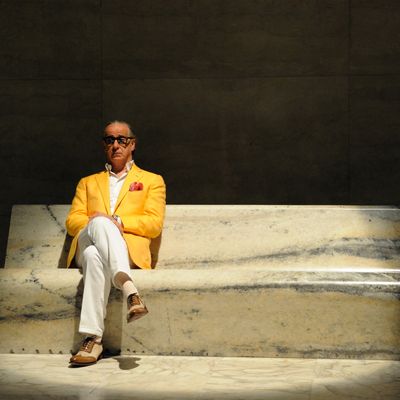
The characters in Paolo Sorrentino’s The Great Beauty like to refer to themselves as royalty: “The King of the High Life,” “the Queen of Misfits,” and so on. There are even some actual princesses — aging, shrewish ones. They haunt galleries and marble-decked salons and piazzas surrounded by statues of gods and kings and saints. But framed against those silent, immobile creatures of the past, today’s wannabes look like a small, sorry lot. They’ve got money and influence to burn, but they’ve got nowhere to go.
Sorrentino’s hero is an aging author named Jep Gambardella (Toni Servillo), who wrote a best-selling masterpiece of Italian literature 40 years ago and has been living off its success these many decades. He hasn’t written anything of note since, save the occasional magazine profile. Instead, Jep gives parties — amazing, explosive, eat-your-heart-out-Gatsby parties — for Rome’s moneyed classes. Sorrentino, unrepentant aesthete that he is, foregrounds the debauchery, and even before we meet Jep, we’re there twirling amid the writhing dancers — some beautiful, some grotesque, some beautifully grotesque. His camera dollies, cranes, and booms in ways both smooth and dizzying. Meanwhile, a tattooed woman strips inside a soundproof glass cage. An aging showgirl jumps out of a giant cake. A dwarf gets tossed. There are shrill breakups and phony courtships. Con men and businessmen cavort with models, models cavort with actors, and Rome’s timeless statues look down on it all. (It helps that Jep has an amazing pad right across the street from the Coliseum. If you’re a fiend for real estate porn, you’ll want to find a way to mainline this movie.) It’s hard to turn our eyes away from all this ravishing imagery. Or for that matter, the eclectic soundtrack: techno mariachi bands jutting up against brassy party music, angelic choirs singing Robert Burns verses, etc. Sorrentino understands that he has to seduce us with Jep’s world, even as he lays bare its soullessness.
Federico Fellini is an obvious touch point here: Sorrentino nods to both the corrosive hedonism of La Dolce Vita and the emotional paralysis of 8½, but his sensuous images outdo even the master’s. The Great Beauty is both a bacchanal and a dirge. Jep has filled his life with fun and frivolity; there’s nothing of substance left. It’s not so much that everybody around him is superficial — for all that venom, the film treats its characters with generosity — it’s that he doesn’t allow them to be anything but. One night, an author friend idly dismisses Jep’s work as shallow, and our hero calmly unleashes a torrent of humiliating criticism, knocking his guest’s class hypocrisy, her readerless books, her supposedly loving husband’s infidelity. At first, it’s a deeply satisfying scene; the guest’s smugness certainly deserved to be taken down a peg. But we quickly realize that Jep could probably bombard anyone with such invective. He sees only hypocrisy and shallowness, without quite realizing that these are traits all humans at various points share. He wants to live, but the idea of life itself is too gauche for him. So, he merely exists, a wax figure, a ghost. (Or maybe something even more sinister: Years ago, I suggested that Sorrentino’s political epic Il Divo might be, symbolically at least, a vampire movie, and I could say the same thing for The Great Beauty.)
As Jep goes from party to party, woman to woman, he has flashbacks to his youth, in particular to one gone-but-not-forgotten love affair that seems to hold a key to his inner malaise. But does it, really? The director likes to code certain important backstory moments in his films, but he never really tells us what they mean. They stand not as signposts but as passages — paths not taken, perhaps, or distant memories of the people we used to be. By the end, we understand very little about what Jep really wants, but we understand better why he’ll never have it.
At one point, Jep interviews a performance artist named Talia Concept, whose act involves shaving a sickle-and-hammer into her red bush and head-butting walls. She talks about “extra-sensoriality” and “vibrations” and then asks him to ask her about her mom’s abusive boyfriend. She’s a total phony, of course, but in her phoniness one senses a need for some kind of connection. In her own bluntly hyper-intellectualized, misguided way, she’s looking for the same thing he is. But again, what is it? I’ve seen the film three times and I’m still not sure. The Great Beauty is a subtly daring cinematic high-wire act — an entire film built around one character’s unrealized, unspecified yearning. And it might just be the most unforgettable film of the year.


